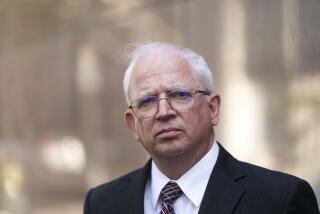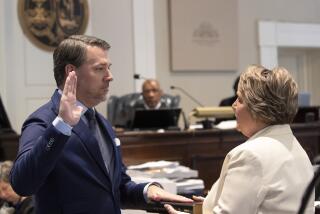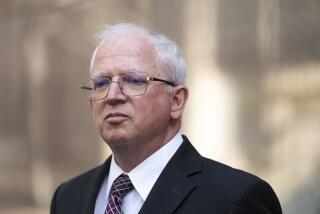State High Court Hears Hedgecock’s Appeal for Retrial : Conviction: Ex-San Diego mayor’s attorney says jurors drank, partied and were improperly advised by bailiff.
- Share via
A lawyer for former San Diego mayor Roger Hedgecock on Tuesday urged a seemingly receptive state Supreme Court to reverse Hedgecock’s 1985 perjury and conspiracy conviction, claiming that a trial-court bailiff provided jurors with liquor and improperly advised them about the law.
“The evidence is sufficient to show that the defendant--whether he be the mayor or a homeless person in San Diego--did not get his right to fair jury deliberations,” attorney Charles M. Sevilla told the justices during an hourlong argument in Los Angeles.
Sevilla, producing a photograph he said showed jurors partying the night before the final day of deliberations, charged that the bailiff had provided liquor to some jury members, apparently leading to the incapacitation of one juror on the morning after.
There was also evidence, he said, that the bailiff had improperly discussed legal questions with jurors--such as what constitutes “reasonable doubt”--and had implied that they should speed their deliberations to save the county money. The bailiff denied most of the allegations.
In reply, state Deputy Atty. Gen. Robert M. Foster contended that Hedgecock was not entitled to a retrial or an evidentiary hearing to question jurors about their conduct and the allegations of jury-tampering. Such a precedent, Foster warned, would inhibit free and full discussion in the jury room.
But the prosecutor encountered a flurry of questions from court members that seemed to reflect doubt Hedgecock had received a fair trial. When Foster argued that jurors could be questioned about their deliberations only in “rare and extraordinary circumstances,” Justice Armand Arabian interjected to ask what could be more unusual than allegations of late-hour drinking by jurors.
“We go into the jury room, and we’ve got vodka and vomiting and a new definition of the term ‘hung jury,’ ” noted Arabian. “Isn’t that rare and unusual?” A ruling by the justices is expected within 90 days.
The 44-year-old Hedgecock, currently a radio talk-show host in San Diego, was convicted of 12 counts of perjury and one count of conspiracy in an alleged plot to finance his 1983 mayoral campaign through the since-defunct investment firm of J. David & Co. The perjury counts stemmed from allegations that he purposely falsified financial disclosure statements to conceal the firm’s involvement.
Hedgecock’s first trial ended in a deadlocked jury. After he was convicted in a second trial, he resigned from office. His sentence of one year in jail and a $1,000 fine was set aside pending appeal.
After the verdict, the former mayor’s attorneys then sought a retrial, producing affidavits from two jurors raising charges of jury tampering by bailiff Allen Burroughs and misconduct by other jury members. The two jurors said Burroughs had provided beer, wine and liquor and drank with jury members when they were not deliberating. On the day the verdict was rendered, one of the affidavits said, one juror who had attended the late-night party had become ill and spent the session on a sofa with a pillow over her head.
The bid for a retrial was denied by then-Superior Court Judge William L. Todd Jr. The judge, acting on the basis of affidavits from all 12 jurors and the bailiff, concluded that there was insufficient proof the alleged actions affected the verdict. But a state Court of Appeal ruled that the judge should have permitted defense lawyers to question jurors and that a full hearing should be held on the jury-tampering charges. If those allegations were proved, the appellate court said, Hedgecock would be entitled to a new trial.
In Tuesday’s lively hearing, Sevilla challenged not only the denial of an opportunity to question jurors but also another finding by Todd that the allegedly false statements or omissions in Hedgecock’s campaign reports were “material”--or significant enough--to support the perjury charge. Such a question, Sevilla said, should have been left to the jury.
Foster argued for the state that the question of “materiality” was a question of law that a judge should decide, not a jury. But several court members appeared skeptical.
Arabian noted that the law requiring campaign financial disclosure was aimed at protecting the public. “Shouldn’t the question of materiality--whether this was important to the community--be placed in the hands of the community the law was designed to serve?” he asked.
Similarly, Justice Allen E. Broussard said the prosecutor’s position “befuddles me.” Cannot the jury be trusted? he asked.
“I have faith in the jury, but this is a legal question for a judge,” replied Foster.
The prosecutor also argued that while Hedgecock had been entitled to seek a retrial on allegations of jury misconduct, he had not been entitled to subpoena jurors to answer questions at such a proceeding. The defendant’s rights must be balanced against the need to protect the integrity of secret jury deliberations, he said.
“If jurors know that something they say in deliberations may end up being made public, that’s going to inhibit discussions in the jury room,” he said.
More to Read
Sign up for Essential California
The most important California stories and recommendations in your inbox every morning.
You may occasionally receive promotional content from the Los Angeles Times.













